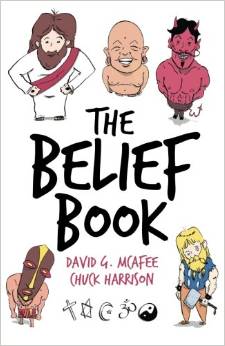Religious Studies Grad, Artist Team Up To Teach Children about Beliefs
Secular author David G. McAfee and illustrator/writer Chuck Harrison worked together on “The Belief Book” – an interactive children’s book that helps to teach kids (and kids at heart) about critical thinking, the origins of beliefs, and religions.
February 7 – Religious Studies graduate and skeptical author David G. McAfee teamed up with Chuck Harrison, an illustrator and writer, to create The Belief Book, which helps kids of all ages on their journey toward understanding the world’s most important beliefs and how they are formed. Children young and old who embark on this quest will learn many things they may have always been curious about, including where the first ideas of “gods” came from and how the earliest religions were created and spread.
This first-of-its-kind children’s book has mental exercises and puzzles that can help anyone understand what beliefs are and how they affect everyone and everything. More importantly, The Belief Book outlines the difference between good beliefs, which are supported by evidence, and bad beliefs, which are based on emotion or biases.
With interactive activities and vivid illustrations, The Belief Book teaches children how to examine evidence and form their own ideas. They will learn the importance of definitions, of language in general, and of the scientific method. The book strives to show readers how to think about things in a way that will get them to the right beliefs, and not just which facts to memorize.
Readers will look at some of the most important questions ever asked, including “Where do we come from?” and “Who made us?” and “Why can’t I have ice cream for breakfast?” By the time they are done with the book, children will not only understand the answers to many of their biggest questions, but they will also see why their questions – and all questions – are so incredibly important.
For interviews or questions, contact:
David G. McAfee | PO Box 9661 | Canoga Park, CA 91304 | United States | David@DavidGMcAfee.com
About David G. McAfee: McAfee is a Religious Studies Graduate, journalist, and the author of two other titles: Mom, Dad, I’m an Atheist: The Guide to Coming Out as a Non-believer and Disproving Christianity and other Secular Writings. He is also a contributor to American Atheist Magazine and an editor for Ockham Publishing. McAfee attended University of California, Santa Barbara, and graduated with bachelor’s degrees in English and Religious Studies with an emphasis on Christianity and Mediterranean religions. He believes strongly that religious education and history should be taught in public schools, including and especially in the United States of America – where general knowledge about those topics is severely lacking. It is only by understanding how the religious systems work, and not by ignoring them completely, that McAfee says we can help others to make rational decisions about them.
About Chuck Harrison: Harrison is an illustrator and writer who lives with his son called Puff and his cat named Monkey in New York. His caffeine fueled works have been printed by DC Comics, Color Ink Book, The South Wedge Quarterly and in many other fine publications. Everything else you may wish to know about him can be discovered at iLikeChuckHA.com.


